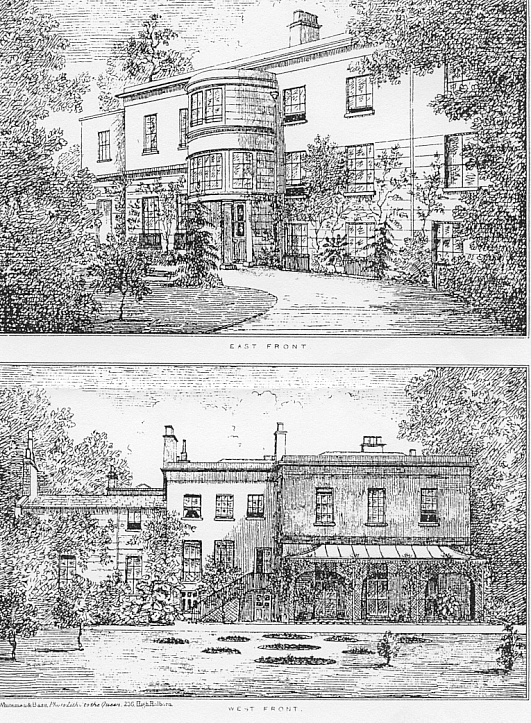Navigation: Hankeys of Churton > John Hankey > Robert Hankey > Robert Hanky > Thomas Hankey > Henry Hankey > Thomas Hankey >
Robert Hankey (1743-1815)
Third surviving son of Sir Thomas Hankey and Sarah nee Barnard; Robert was born on 18 Sep 1743, possibly at Clapham, and was baptised on 12 Oct at St Dionis Backchurch. He was married on 17 Feb 1765 at St Dionis Backchurch to Anne Penton (1750-1811), daughter of Henry Penton (1705-1762), MP for Winchester; the bride was aged only fifteen years and one month. They had one son and two surviving daughters:
Augustus Robert |
1768-1830 |
(see below) |
Matilda (Matty) |
1770-1841 |
(see below) |
Henrietta (Hennie) Anne |
1791-1833 |
Wife of Captain John Hirst; issue |

Robert Hankeys house in Putney
Robert entered the family bank in Fenchurch Street in about 1764, but he also developed outside interests:
- By 1765 he was trading as Guinaud & Hankey with a Canadian merchant in furs and other goods named François Baby. But by the early 1770s Robert Hankey was complaining that the poor quality of Baby’s furs resulted in marketing problems in London., and the trading arrangements were terminated in 1773.
- By 1772 he had become a Director of The London Assurance Corporation, but ‘despite the fact that he was Governor during the years 1809-15, eventful as they were in European history, appears to have left little record of his personality that one can trace in the Corporation’s archives.’
- In 1772 Robert Hankey petitioned to the Board of Trade and Plantations for a grant of 2500 acres of land in South Carolina.
- By 1774 he was a hop merchant at 12 Bishopsgate Street.
- In 1775 he took steps to recover money owing by a monsieur Admiral of Guadeloupe under a contract dated 1768.
It was possibly one of these risky businesses which resulted in his receiving in 1784 a legacy of £4,000 under a January 1781 codicil to the will of his uncle John Barnard ‘in some compensation for the great loss he has sustained in his trade and partnership’. Robert had become a partner of Hankeys Bank by 1778, and became senior partner on the death of Joseph Chaplin Hankey in 1803. He was High Sheriff of Surrey in 1799.
Robert lived at Gordon House in Putney, a charming white house with large grounds at the top of Putney High Street. He travelled from Putney to Fenchurch Street in his own coach, but moved with his family to Fenchurch Street for three months each winter.
Anne died on 5 Aug 1811 at Putney and was buried there on 12 Aug. Robert Hankey had an apoplectic siezure in December 1814, another in March 1815 and a third and fatal attack on 16 Jun 1815, two days before the Battle of Waterloo. Aged 71, he was buried on 23 Jun at Putney, leaving an estate sworn under £30,000.